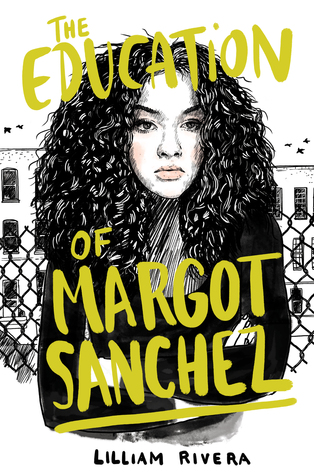The Education of Margot Sanchez - Lilliam Rivera
THINGS/PEOPLE MARGOT HATES: Mami, for destroying my social life; Papi, for allowing Junior to become a Neanderthal; Junior, for becoming a Neanderthal; This supermarket; Everyone else.
After “borrowing” her father's credit card to finance a more stylish wardrobe, Margot Sanchez suddenly finds herself grounded. And by grounded, she means working as an indentured servant in her family’s struggling grocery store to pay off her debts. With each order of deli meat she slices, Margot can feel her carefully cultivated prep school reputation slipping through her fingers, and she’s willing to do anything to get out of this punishment. Lie, cheat, and maybe even steal…. Margot’s invitation to the ultimate beach party is within reach and she has no intention of letting her family’s drama or Moises—the admittedly good looking but outspoken boy from the neighborhood—keep her from her goal.
After “borrowing” her father's credit card to finance a more stylish wardrobe, Margot Sanchez suddenly finds herself grounded. And by grounded, she means working as an indentured servant in her family’s struggling grocery store to pay off her debts. With each order of deli meat she slices, Margot can feel her carefully cultivated prep school reputation slipping through her fingers, and she’s willing to do anything to get out of this punishment. Lie, cheat, and maybe even steal…. Margot’s invitation to the ultimate beach party is within reach and she has no intention of letting her family’s drama or Moises—the admittedly good looking but outspoken boy from the neighborhood—keep her from her goal.
THIS BOOK IS OUT TOMORROW!!!
Margot lives a relatively privileged life. She goes to a prestigious private school, has rich friends with homes in the Hamptons, and doesn't always think before she acts. After stealing her father's credit card and wracking up $600 in charges, Margot's summer plans are put on hold as she goes to work at her father's supermarket, with her older brother (a rather obnoxious and hot-headed young man) and a number of his female "conquests." When she meets Moises (a young man working to stop gentrification in the neighbourhood), however, everything starts to change; Junior becomes even angrier, her father starts to get on edge, and she starts out on a new rebellious streak.
This novel is great in that it follows Margot's development from privileged and rather oblivious, to plugged in and very much aware of the complexities inherent in the mixed demographic in her community. Although Margot is not very appreciative of her family at the beginning, she certainly comes to better understand their motives as the novel moves forward. Even through the seriousness, there is a good balance of humour as well, making the novel accessible for a larger audience.
Another part of the book that I never thought about until I read another post, was the fact that the Spanish words and statements are not italicized. This may not seem that important, but it allows the English/Spanish mix within dialogue to flow more smoothly, and the Spanish is thus not treated as "other" within the text. Rivera's writing is compelling and the story is hopeful. There is so much to enjoy and appreciate here!
Recommended
(NOTE: This review is from an Advance Reader's Copy - Out Feb. 21, 2017)
Margot lives a relatively privileged life. She goes to a prestigious private school, has rich friends with homes in the Hamptons, and doesn't always think before she acts. After stealing her father's credit card and wracking up $600 in charges, Margot's summer plans are put on hold as she goes to work at her father's supermarket, with her older brother (a rather obnoxious and hot-headed young man) and a number of his female "conquests." When she meets Moises (a young man working to stop gentrification in the neighbourhood), however, everything starts to change; Junior becomes even angrier, her father starts to get on edge, and she starts out on a new rebellious streak.
This novel is great in that it follows Margot's development from privileged and rather oblivious, to plugged in and very much aware of the complexities inherent in the mixed demographic in her community. Although Margot is not very appreciative of her family at the beginning, she certainly comes to better understand their motives as the novel moves forward. Even through the seriousness, there is a good balance of humour as well, making the novel accessible for a larger audience.
Another part of the book that I never thought about until I read another post, was the fact that the Spanish words and statements are not italicized. This may not seem that important, but it allows the English/Spanish mix within dialogue to flow more smoothly, and the Spanish is thus not treated as "other" within the text. Rivera's writing is compelling and the story is hopeful. There is so much to enjoy and appreciate here!
Recommended
(NOTE: This review is from an Advance Reader's Copy - Out Feb. 21, 2017)

Comments
Post a Comment